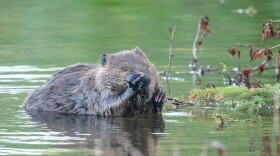-
Invasive plants are not just a backyard nuisance—they’re one of the biggest drivers of long-term habitat loss in the Huron River Watershed. Matthaei Botanical Gardens & Nichols Arboretum in Ann Arbor have become a local model for tackling the problem through coordinated stewardship and public engagement. WEMU's David Fair found out what they’re doing with Natural Areas Specialist, Steven Parrish.
-
Ypsilanti is beginning the process of transitioning to dark sky compliant lighting around the city with its new ordinance. WEMU’s Ana Longoria has the details.
-
Several Washtenaw County communities, including Pittsfield Township and the City of Ypsilanti, are encouraging residents to leave a layer of leaves in their yards to support the local ecosystem. WEMU’s Ana Longoria reports.
-
Washtenaw County is currently experiencing a mild drought that is impacting the Huron River and the wildlife that relies on it. WEMU’s Ana Longoria has the story.
-
The City of Ypsilanti is looking to give a boost to stargazing while aiding wildlife. The City Council tonight will take a first look at a Dark Sky Compliance Ordinance. WEMU’s Kevin Meerschaert reports.
-
Between 1995 and 2023, the City of Ann Arbor’s Natural Area Preservation (NAP) division coordinated a continuous butterfly monitoring program using trained community science volunteers. Ludovico Behrendt is an environmental data specialist with NAP and conducted a retrospective analysis of this nearly 30-year dataset. He joined WEMU's David Fair to discuss the findings on the health of butterflies in the area and what it says about the health of the local environment.
-
The Republican-led Michigan House Oversight Committee approved a slew of legislative subpoenas Tuesday directed at state departments, including the Attorney General’s office. Rick Pluta reports.
-
The local community has been raising concerns over the City of Ann Arbor and the Washtenaw County Water Resources Office's choice to exterminate beavers in Ann Arbor. WEMU’s Ana Longoria has more.
-
The Michigan Department of Natural Resources is reporting a deer in Washtenaw County has tested positive for Chronic Wasting Disease, or CWD. WEMU’s Kevin Meerschaert has this report.
-
The City of Ypsilanti is looking to make stargazing more enjoyable while protecting wildlife. WEMU's Kevin Meerschaert has this report.

Play Live Radio
Next Up:
0:00
0:00
Available On Air Stations









